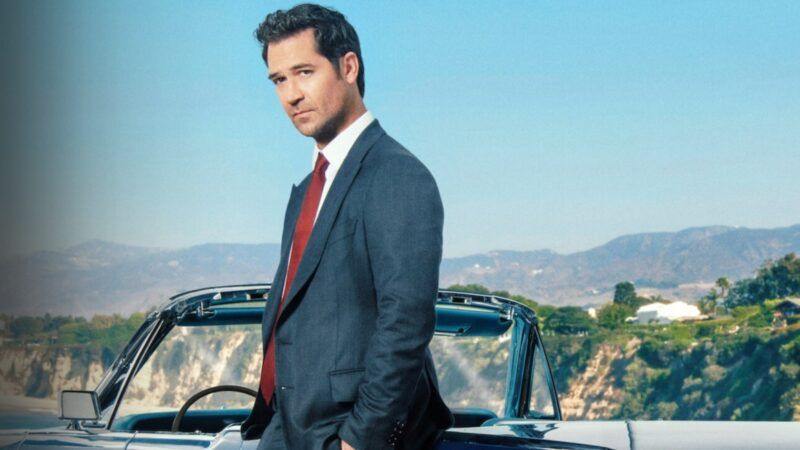David E. Kelley Brings Legal Thriller The Lincoln Lawyer to Netflix
Adaptation of Michael Connelly’s book series is punchy, clever, and entertaining.

The Lincoln Lawyer. Available now on Netflix.
Economics has subverted the eccentricity and even the title of Netflix's legal drama The Lincoln Lawyer, which chronicles the adventures of a criminal-defense attorney who prefers working out of his plush automobile to an office. When The Brass Verdict, the novel from which The Lincoln Lawyer is loosely adapted, was published in 2008, gasoline was selling around $4.08 a gallon. These days such a guy would have to land an O.J. Simpson case a week to keep his lawyermobile moving.
But that's about the only flaw in The Lincoln Lawyer's distinguished creative chromosomal creative code. Based on a character created by the zillion-selling suspense author Michael Connelly, produced by the awesome David E. Kelley* and Ted Humphrey (The Good Fight), The Lincoln Lawyer would have refuted every concept of order in the universe had it failed.
And it doesn't. Punchy in its writing and crunchy in its casting, The Lincoln Lawyer is irresistibly entertaining, a Perry Mason for our time. (And yes, I remember that HBO already has a Perry Mason for our time, but we'll figure that into the rankings if its oft-delayed second season ever actually shows up.)
The Mason-esque character in The Lincoln Lawyer is Mickey Haller (Manuel Garcia-Rulfo, From Dusk Till Dawn: the Series), once a crack Los Angeles defense attorney, now washed up by injuries from a surfing accident and an ensuring addiction to painkillers. But his career is catapulted back to life when a former colleague inexplicably rewrites his will to leave his entire practice to Haller and is promptly murdered, professional-hit style.
That's a boon to Haller's practically-disappeared career. But it comes with a considerable downside. He's now awash in cases he knows nothing about, including a trial-of-the-century extravaganza—of an obnoxious and possibly guilty young video-game mogul named Trevor Elliot (Christopher Gorham, Insatiable) who cops found standing over the bloody corpses of his wife and her lover—that gets underway in just a week. And Haller can't find any files on the case because they were apparently stolen by whoever gunned down his predecessor.
This leads to a possibly more troubling issue: Did the killing have something to do with one of the cases Haller inherited? Is he in danger now? It's quickly apparent that the answer to both questions is yes, giving birth to any number of intriguing—and deadly—subplots, each accompanied by a gut-wrenching episode cliffhangers.
In some ways, The Lincoln Lawyer is constructed much like a typical David E. Kelley legal drama (they include L.A. Law, Ally McBeal and The Practice, among many others), with a Garcia-Rulfo playing charming, brilliant defense attorney supported by a thoroughly lovable cast of finely honed supporting characters: Lorna (Becki Newton, How I Met Your Mother), Haller's acidly affectionate second ex-wife and office manager; Cisco (Angus Sampson, Fargo) as Haller's scruffy ex-biker investigator, as well as Lorna's current boyfriend; Maggie (Neve Campbell, House of Cards) as Haller's first ex-wife, a prosecutor whose cases sometimes brush shoulders with his; and Izzy (Jazz Raycole, My Wife and Kids), an ex-client and ex-junkie who works as Haller's chauffer. The messy agglomeration of relationships makes the show's barbed dialogue to fly thick and fast.
But there are also some oddities in The Lincoln Lawyer. In the early episodes, it often has the "Case of the Week" format of legal dramas on broadcast television as Haller tries to whittle down all the criminal trials he inherited with his new practice. As the show moves along, the Trevor Elliott case crowds out everything else. That may be the result of The Lincoln Lawyer's odd show-biz birth; it was originally slated for CBS, then abandoned to Netflix. The show's broadcast-net ancestry also doubtless accounts for its low levels of sex and violence compared to usual premium-cable fare.
Slightly more distracting, at least to fans of the 2011 film The Lincoln Lawyer (of which there are more than a few), which was based on a different book in the series, is the switch from the highly idiosyncratic Matthew McConaughey in the lead role to the much lower profile Garcia-Rulfo. The change works out pretty well. Garcia-Rulfo takes a pleasantly understated approach to his character. Like the rest of the cast (and very unlike that of the 2011 film The Lincoln Lawyer, based on a different book in the series, which starred Matthew McConaughey but also included William H. Macy, Marisa Tomei, John Leguizamo, Bryan Cranston and Michael Paré, all of them with too little to do), Garcia-Rulfo takes a pleasantly understated approach to his character. **
He brushes past both his appeal to the ladies and his bursts of legal wisdom. He's a bit more upfront about his squishy ethics—he's not above planting fake stories in newspapers and dancing right up to the edge (but never quite past it) of outright falsehood in the courtroom. He scoffs at lawyers who say they're searching for fair-minded jurors: "I don't want fair-minded jurors. I want them biased as hell—for me. I want 12 lemmings in a box." I don't know if they teach that in law school, but in The Lincoln Lawyer, it works very well.
CORRECTIONS: * The original version of this story misstated the producer's first name.
** The original version of this review misstated the ethnicity of Haller in the books.


Show Comments (19)